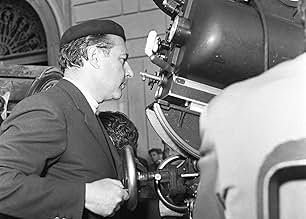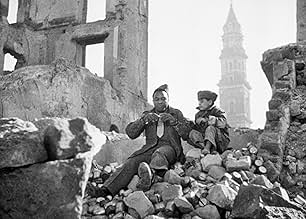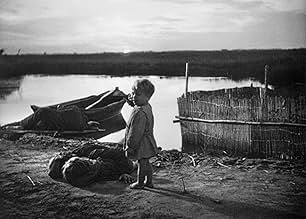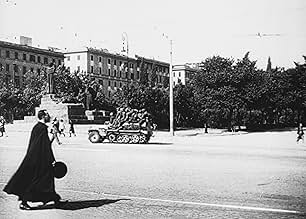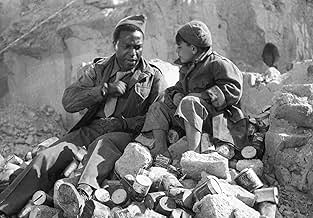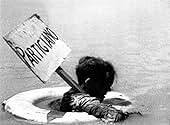अपनी भाषा में प्लॉट जोड़ेंAmerican military personnel interact warily with a variety of Italian locals over a year and a half in the push north during the Italian Campaign of WWII as German forces make their retreat.American military personnel interact warily with a variety of Italian locals over a year and a half in the push north during the Italian Campaign of WWII as German forces make their retreat.American military personnel interact warily with a variety of Italian locals over a year and a half in the push north during the Italian Campaign of WWII as German forces make their retreat.
- 1 ऑस्कर के लिए नामांकित
- 10 जीत और कुल 2 नामांकन
- American Soldier (episode I: Sicilia)
- (as Leonard Penish)
- Joe - American MP (episode II: Napoli)
- (as Dots. M. Johnson)
- Pasquale (episode II: Napoli)
- (as Alfonsino)
- Harriet - Nurse (episode IV: Firenze)
- (as Harriet White)
फ़ीचर्ड समीक्षाएं
The film is made of six episodes following not only a chronological but geographical story line. The first episode is set the very day the Allies landed in Sicily, their first one in the European continent, in that crucial summer 1943. Sicily marked the beginning of the end for Nazis but what a nightmarish, thrilling and inspirational journey before getting to that triumphant end.
Each episode of "Paisa" ('buddy' in Italian) is set in a specific city: Rome, Napoli or Florence, but it's less in the setting that in the variety of situations that the experience of war is so unique and groundbreaking. For instance, most war movies involve ordinary battles, bridges or railroads to blow, towns to free, prisoners to handle and so forth, but "Paisa" explores in a deeper way situations we generally take for granted. A film like "Patton" shows us the Allies entering in Sicily, but in "Paisa", we're confronted to the first patrols, meeting defiant villagers with the language gap playing a significant part. The most memorable relationship of this segment involves a GI named Joe, from New Jersey and local Carmela, a Sicilian girl who reluctantly guided his patrol to an unoccupied castle through a mine-free way.
The first shades of genius start to show through the communications struggles between two persons who couldn't have been more opposite, yet are united by similar desires: she wants to see her parents, he wants to go home, and when he finally finds a way to communicate, and just when you think we're about to have a love-at-first sight moment, something happens that shows you how war has never been much of a plot-maker, and one way leading to another, after five minutes, with the closing of the first chapter, we're haunted by the story's poignant irony, and we're looking forward to witness similarly humanistic tales. Naturally, they are not of the same emotional resonance, as there's no specific pattern guiding the stories, but all through the film, our hearts swing between contradictory emotions: warmth, humor, anger, sadness and shocks through the outburst of violence, reminding us there's a war, after all.
The second and third chapters are the first to feature non-life threatening situations, one deals with the unlikely relationship between Joe, an African-American soldier, and a little street scamp who reminded me of the 'Shoeshine" kids (actually, the story has something to do with shoes) but it's so unlike the first one that we're a bit puzzled before getting the emotional implications of its ending. The third chapter is interesting too in the way it takes place in the aftermath of liberated towns, and plays like an ironic twist on the typical images of pretty girls kissing their liberators. Indeed, the disillusion caused by war ends up affecting 'innocent' girls. Of course, when compared to killings or rapes, prostitution strikes as the lesser of two evils, but the story again, defies all the conventional implications of a love story, quickly sacrificed on the altar of war's inner sleaziness.
The following episodes are more in line with the usual war material, especially the fourth one featuring an American nurse and an Italian resistant running through Florence in the midst of a ferocious battle between Italian partisans, Nazis and their die-hard fascist allies, in a desperate quest to find their loved ones, her lover, a legendary resistant named 'Lupo' and his family. The ending echoes the Sicilian chapter. Finally, the last one is perhaps the grittiest and ugliest, but a necessity when you consider the anti-war statement the film makes: partisans, who are seen in previous chapters are mercilessly shot by the Germans on the basis that they are not covered by the Geneva conventions, their execution is not without protests, nor sanctions to these protests. The film questions the pretensions of civilization, how can civilization orders destruction, killings, how can it destroy human feelings such as life and love.
Which leads me to the most puzzling chapter, where three American chaplains are welcomed to stay in a Roman monastery. It's a place of peace and quietness and for a while, it seems that there is nothing but mutual respect and gratitude between the men, until the monks learn that two chaplains happen to be Jewish and protestant, lost souls as they say. Indeed, at a time where humanity lost its soul, literally, where war has proved to be the anti-thesis of civilization, the monks' reactions is simply perplexing. I don't think there was any anti-religious undertone to it (remember the heroic priest who prayed for an atheist Communist in "Rome, Open City") but more of a way to show how ironically lost, the men who never really got in touch with war, ended up being. This is one of the many ironies, the brilliant, multi-layered and Oscar-nominated screenplay is full of.
And this is to the credit of Roberto Rosselini and the six writers, including Fellini, who made these chapters, to have assembled these slices of Italian and American lives at a time where Italy was trying to restore some of its lost dignity. And a film like "Paisa" is a powerful homage to the souls that were either killed or destroyed by war. On a technical point, some images get a bit blurry, some actors are less professional than others, but it is so obvious that most of the film was shot like a documentary, that these flaws are small prices to pay for such a historical magnitude, this is as far as neo-realism could ever go.
Rossellini engaged six writers, each of whom was to write one episode: Klaus Mann, Marcello Pagliero, Sergio Amidei, Federico Fellini, Alfred Hayes, and Vasco Pratolini. Each episode took place in a different location. The script notwithstanding, Rossellini often improvised with the actors and rewrote the stories as they were being filmed. For the first episode filmed in Sicily, Rossellini discarded the script and coached the non-professional, illiterate lead actress Carmela Sazio to a performance that received critical praise.
I love the variety of views on World War II. What is especially interesting is how we start with the point of view of the Allies. For much of the war, Italy was not an Ally but was ruled by Mussolini, who gravitated towards Hitler. (Though Italy was the least "evil" of Germany, Japan and Italy.) So this film seemingly champions the recent enemy...
Exploring the links between fiction and documentary, observation and education, and the individual and society, he was an important figure in the development of the cinema...
Rossellini said of the film: 'In Paisá there were two worlds which came into contact, each with a different psychology and mental structure. From this contact was born a great confusion; so much so that in the end there were neither victors nor vanquished, there remained only the everyday heroism of the man who clings to life. And who lives, despite everything, whether he is one of the victors or one of the vanquished.'
Rossellini followed 'Rome Open City' with the equally impressive Paisá, whose six, often barely dramatic stories of part-comic, part tragic encounters between Italians, Germans and liberating Americans were rooted in specific locations (the Po Valley, the Uffizi Gallery), but were universal in their portrait of an entire nation destroyed and divided by war...
Already Rossellini's taste for long, mobile takes in long shot (rather than montage and close-up) gave evidence of his desire to relate individuals to the world around them...
In using a number of non-professional cast, and combining them with his improvisatory techniques, Rossellini get an universally acclaimed human document of rare quality and compassion...
Georges Sadoul wrote that Rossellini had 'damned the horrors that war had brought to his country and his heart cry was emotionally and enthusiastically understood around the entire world.'
An American recon squad enters a Sicilian village. One of them comes from a Sicilian background. Local girl Carmela guides them past German mines taking shelter in an old ruin. Joe stays with Carmela as the rest of the squad explores and they are surprised by a small squad of Germans. Carmela Sazio is very stiff as an actress. She's an amateur and there's value in that. However her character has a lot of emoting to do and she has trouble doing it.
A group of street performing kids in Naples find drunken negro soldier Joe. Pasquale takes him around and they have an adventure. The poor kid steals from him. He turns out to be an MP and later he finds Pasquale. He is angry and drags Pasquale back home. The poverty of his home convinces Joe to leave him the boots. The kids are terrific and in this case, it's unlikely to get better actor than this amateur kid.
In a liberated Rome, American GI Fred spends the night with prostitute Francesca. He has been searching for a woman he met 6 months ago and she realizes that she's actually that woman. This is a great story but I'm not sure it's set up right. It would be great to see them 6 months earlier.
Half of Florence is liberated. All but one bridge has been blown and the partisans are struggling against the Germans. American nurse Harriet is desperate to get across to find her love. She is joined by Massimo looking for his family. The location shoot of them sneaking around an abandoned Florence is amazing.
A monastery escapes damage from the war and is visited by three American chaplains. Catholic Captain Bill Martin translates but the monks are shocked to find the other two are a Protestant and a Jew. The monks intent on converting the two disbelievers.
It's the closing stage of the war in Europe, American OSS and Italian partisans are struggling behind German lines in the Po delta. Supplies are dwindling and the fight is deadly. They rescue two downed British airmen. They are ambushed and captured. This is the most brutal of the stories and it ends the movie with its most brutal scenes.
क्या आपको पता है
- ट्रिवियाThe monks in the fifth episode were authentic Franciscan monks from the Maiori convent, near Salerno.
- गूफ़At approximately 1:36 (2:05 version), during Episode V, as the American Army Catholic Chaplain stands in the center of the screen discussing his two associate Army Chaplains (Protestant and Jewish) with the monks, you can see two individuals standing in the doorway behind them (they appear to be the other two Army Chaplains). In less than a minute, they suddenly disappear.
- भाव
Captain Bill Martin - the catholic chaplain (episode V: Appennino Emiliano): I've never examined their consciences. I've never discussed this with them. I've never asked them anything, because I never felt I could judge them. I know them too well. They're good friends. Perhaps you, here mind this peace, this atmosphere of serene meditation, consider me guilty. I don't feel guilty. My conscience is clear.
- इसके अलावा अन्य वर्जनOriginally premiered at the Venice Film Festival on September 8, 1946 in a longer cut (running 134 minutes). Later cut to 125 minutes. The 134 min. cut has been restored from material found at the Bundesarchiv-Filmarchiv in Berlin, Germany and has premiered at the 55th Venice Film Festival in 1998.
- कनेक्शनEdited into Il sasso in bocca (1970)
टॉप पसंद
- How long is Paisan?Alexa द्वारा संचालित
विवरण
- रिलीज़ की तारीख़
- कंट्री ऑफ़ ओरिजिन
- भाषाएं
- इस रूप में भी जाना जाता है
- Paisan
- फ़िल्माने की जगहें
- Uffizi Gallery, फ्लोरेंस, टस्कनी, इटली(episode IV: Firenze)
- उत्पादन कंपनियां
- IMDbPro पर और कंपनी क्रेडिट देखें
बॉक्स ऑफ़िस
- दुनिया भर में सकल
- $967
- चलने की अवधि2 घंटे 6 मिनट
- रंग
- ध्वनि मिश्रण
- पक्ष अनुपात
- 1.37 : 1
इस पेज में योगदान दें


